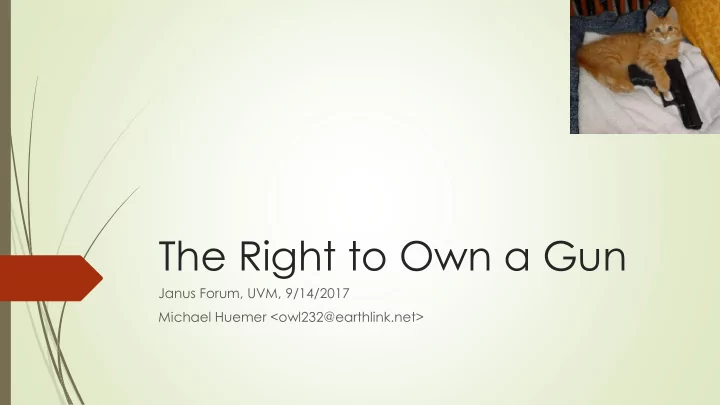

The Right to Own a Gun Janus Forum, UVM, 9/14/2017 Michael Huemer <owl232@earthlink.net>
The Accomplice-to-Crime Argument Examples i. Killer enters Victim’s house. Accomplice holds Victim down while Killer stabs Victim to death. Verdict: Accomplice’s action is not much better than Killer’s. ii. Killer enters Victim’s house. Victim intends to defend self with gun. Accomplice grabs gun and runs away. Killer stabs Victim to death. Verdict: Accomplice’s action is not much better than Killer’s. iii. Citizen wants to own a gun for self-defense. State forcibly prevents Citizen from having a gun, or takes away Citizen’s gun. Citizen is then victimized by a criminal. Verdict?
The Accomplice-to-Crime Argument Argument 1. Gun control laws coercively prevent some individuals from defending themselves against crimes. 2. Coercively preventing someone from defending themselves against a crime is seriously wrong. Sc., it is morally comparable to committing the crime. Support: See examples i-ii above. 3. So gun control laws are seriously wrong. Sc., they are morally comparable to the state committing multiple murders, rapes, assaults, and robberies.
Rights vs. Consequences Examples iv. A crime causing great public outrage has occurred. Unless someone is punished, there will be riots, causing injury to many innocent people. The sheriff cannot find the criminal, but he can frame an innocent person, to forestall the riots. Verdict: Do not frame the innocent. v. Somehow, killing one innocent person will prevent a world war. Verdict: Maybe kill the innocent person.
Rights vs. Consequences Conclusions It is wrong to violate an individual’s rights, even to produce greater, comparable benefits to others. It may be justified to violate an individual’s rights to produce many times greater benefits for others. So: Gun control is wrong, even to prevent greater, comparable harm to others. Gun control might be justified, (only) if it prevented many times as much harm as it caused.
Costs and Benefits Empirical Evidence Defensive gun uses: Widely varying estimates. (55,000 – 4.7 million per year) Low estimate: NCVS, by Dept. of Justice. Non-anonymous. DGU question not asked of all participants. Most cited estimate: 2.5 million (Kleck). High estimates are much higher than # of serious crimes. Concealed weapons: “Shall - issue” laws may reduce crime ( Lott). Disputed by others. NRC says the results are sensitive to assumptions, and no firm conclusion can be drawn. Conclusion? No consensus.
Further Reading M. Huemer, “Is There a Right to Own a Gun?” Social Theory and Practice 29 (2003): 297-324, http://www.owl232.net/guncontrol.htm. ––––––. “Gun Rights and Noncompliance: Two Problems Of Prohibition,” The Critique , 7/14/2016, http://www.thecritique.com/articles/gun-rights- noncompliance/. National Research Council, Firearms and Violence: A Critical Review (National Academies Press, 2005), http://www.nap.edu/read/10881. John Lott, More Guns, Less Crime , 3 rd ed. (U of Chicago Press, 2010). Gary Kleck, Targeting Guns (Routledge, 1998).
Recommend
More recommend